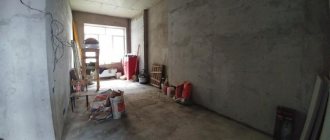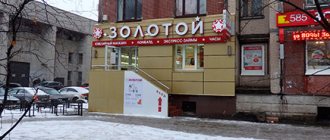The development of residential areas with multi-apartment buildings (MABs) is always associated with the organization of infrastructure. This is what led to the development of residential building projects with ground floor areas for convenience stores, hairdressers, consumer services, libraries, catering and much more. With the development of entrepreneurship, the demand for premises increased sharply and apartments on the ground floor began to be actively purchased. The scope of their use has also expanded.
It would seem that everything is simple, the apartment is owned and there should not be any legal problems. But everything is not as simple as it seems at first glance. What objects in a residential building are classified as non-residential? What responsibility do the owners bear, and how are the issues of using the common property of apartment buildings regulated? We will try to provide answers to all pressing questions.
Definition of non-residential premises according to the Housing Code of the Russian Federation
From the norms established by Chapter 3 of the Housing Code of the Russian Federation, it follows that premises in an apartment building are considered non-residential if they are not suitable for living. These areas meet the requirements for use for commercial, social or community activities.
According to the Decree of the Government of the Russian Federation No. 354 “On the provision of utility services to owners and users of premises in apartment buildings and residential buildings,” information about real estate must be contained in the technical documentation of the apartment building. Non-residential premises should not violate the architectural appearance of the facility in which it is located.
Intended use of real estate not intended for residential use
The purposes for using non-residential space in residential buildings are clearly stated in the documentation during registration. It is impossible to change a retail outlet to a dental office without re-registration.
Sanctions for inappropriate use include:
- a fine of 1000 to 1500 rubles and an order to eliminate the violation within a strictly established time frame;
- refusal to legitimize unauthorized buildings and reconstructions.
In cases of conducting unregistered or unauthorized activities, the organization faces closure or a ban on conducting activities, by a court decision.
What business to open
The decision about what kind of business to open in a small space depends on many factors, such as:
- the presence of an original idea and the ability to implement it under existing conditions at acceptable costs;
- usable area size;
- the nature of the location of the premises (number of floors, neighbors, front exit, etc.);
- possible inconvenience for neighbors (noise, dust, odors, waste and other side effects that can cause conflicts);
- area.
The last factor is a priority for a business that depends on the activity of visitors. Let's take a closer look at it.
Central part of the city
The most prestigious catering establishments and the most popular shopping outlets are located in the center of even a small city. Regardless of the type of premises, it costs more than the same one, but in a residential area. Basements and semi-basements can be used as an art salon with exhibitions and sales, an elite boutique, a gym, a psychologist's office, a private museum or a store with a non-standard assortment. An excellent option is a small tea or coffee shop, but when choosing, it is advisable to objectively assess the level of competition.
The special requirements imposed by municipal authorities on businesses in historical areas should be taken into account. There will likely be difficulties in transporting goods due to limited road traffic. There is no question of creating any discomfort for passers-by.
Options for organizing a repair shop (mobile phones, laptops, computers, household appliances) are in demand, but their implementation requires professional skills.
Sleeping areas
It is possible to start a business in a residential building, even an apartment building, but this option has certain specifics. Of course, formally (by law) you can make noise from nine in the morning to eight in the evening, but experience shows that conflicts with neighbors do not lead to good things.
In your own apartment, it is advisable to do things that are quiet and require special skills. To do this, it is best to allocate a separate room and, for example, tutor or translate texts into foreign languages.
There are also artisanal production options. Many people make goods at home that are in demand, including those related to the food group.
Several precautions are recommended that are contrary to the conditions for success in other types of business. In particular, it is undesirable for visitors to crowd into the home. It’s better to do without prying eyes altogether. To do this, supply and sales issues need to be resolved in a “neutral” zone, and payments must be accepted via electronic wallets or bank card.
Features of choice for large spaces
Industrial zones are part of any industrial city. Premises on the territories of closed enterprises are sometimes empty. Ordinary citizens own such objects extremely rarely, but anything can happen in life.
Usually, areas remote from the center are easily accessible by intercity highway. The first thing that comes to mind when assessing the prospects for using spacious premises is a warehouse or production. You shouldn’t get hung up on these simplest options, although they are certainly good. The spacious premises of the former workshop can be proudly called a loft and you can organize anything you want in it: a fashionable youth club, a sports complex, a gym, and if the first floor, then a car service station or a car wash.
Who can occupy non-residential premises and what requirements must be met?
Non-residential premises can be used by the owner or rented out under a lease agreement. The owner is responsible for the condition and rules of its operation. In the case of a lease, responsibility remains with the tenant. The organization occupying the area of the apartment building is obliged to fulfill the following requirements:
- Provide a separate entrance. The entrance roof should not exceed the height of the second floor floor.
- Allow repair workers to access common building systems and communications during repairs. Notify housekeeping workers about the need for unscheduled repairs.
- Do not exceed the permissible noise level. Carry out noisy work only at specified times.
- Load and unload goods and equipment in places where there are no windows.
According to the Housing Code of the Russian Federation, non-residential objects can only occupy the area of the first floor. Apartments on the second floor can also be used as non-residential real estate, but provided that the entire first floor of the building has already been given over to the needs of various organizations. Areas not intended for residential use cannot be located either next to residential apartments or above them.
When complaints are received from residents about violations of sanitary and epidemiological standards, a court decision may order the payment of moral compensation to the injured party.
Main advantages
Conducting business activities in non-residential premises has a number of advantages:
- Business gets its own “territory”.
For example, you can tailor clothes to order at home, or you can open an atelier by renting a small room. In the first case, the business is a “guest” on the “territory” of your home. In the second - the “owner” of the rented premises. Having your own “territory” disciplines the entrepreneur and also stimulates him to be more active. - Empowerment.
Not all activities can be done at home. By opening a store, office or warehouse, you expand the capabilities of your business. The store will increase sales volumes, the office will become the official representation of the business and the workplace of employees, the warehouse will accommodate all available inventory and raw materials. - Advertising platform (point of sale).
Imagine, there is an unknown individual entrepreneur Ivanov. Stays at home, provides accounting services to legal entities and individuals. Places a small line advertisement in the newspaper every week, lives inconspicuously, hardly goes out to people, sometimes forgets his name. And then one day his father-in-law comes to Ivanov in a dream and says: “Open an office, otherwise I’ll come to you every night!” The accountant wakes up in a cold sweat shouting: “No! Not this, Vasily Kirillovich!” In general, the next day Ivanov rents a small room in an office center and places an advertising sign “Quality accounting services” at the entrance. After some time, IP Ivanov will call his father-in-law dad for the first time in 15 years... Nothing special happened in this story. Simply, the office became an advertising platform for IP Ivanov - visitors to the office center, thanks to a well-placed sign, gradually learned about the services of this entrepreneur. The costs of renting the premises were recouped many times over thanks to the attracted clients. Six months later, Ivanov hired several assistant accountants, and a year later he opened an accounting firm and transferred all the routine work to his subordinates. As a result, it grew from a small, unknown individual entrepreneur. A similar situation exists with opening a store. In essence, you have an additional point of sale, which helps increase sales volumes. - Formation of the “correct” image of the company.
Most types of businesses operate in a competitive environment. Naturally, every sensible manager strives to present his company in the most attractive format. The premises are one of the key objects in the formation of the image. As an example, we can cite IP Ivanov, our hero from the previous paragraph. Tell me, who will inspire more confidence in you: the inconspicuous individual entrepreneur Ivanov or LLC Ivanov-consulting-father-in-law? Individual entrepreneur Ivanov lives with his wife’s family in her two-room apartment and receives his clients there. When you come to Ivanov-consulting-test LLC, you immediately plunge into the business atmosphere of this company. Stylish dress code for employees, corporate symbols, high team spirit, disciplined office furniture - all these factors can immediately instill trust and willingness in the client to cooperate. In general, image is not the last thing, friends!
So, we’ve sorted out the advantages, now let’s look at the main functions for which a business uses non-residential real estate.
Technical requirements for non-residential premises and the use of these facilities
In areas where people do not live, the availability of all utilities is not necessary. There may be no gas supply or bathroom if they are not needed to organize the declared activity. One of the main conditions is compliance with fire and sanitary safety standards.
The premises must have a technical plan approved in accordance with the established procedure. Restructuring and redevelopment to suit the needs of the organization must be coordinated and not pose a danger to residents.
Is the common property in the house non-residential premises?
Common property: staircases, basements, attics are not considered non-residential premises. This is the common property of apartment owners, performing a specific function. Commercial activities cannot be conducted in these areas without special registration. An exception is utility rooms and utility rooms for utility workers, if they are hired by a homeowners association (HOA) and are equipped accordingly.
Non-residential premises of apartment buildings include underground parking for vehicles.
What influences the success of a business in non-residential premises
Every city has different business processes. Some companies open, others cease to exist. So I periodically discover new shops, cafes, and offices on the streets. You know, I often manage to immediately predict their fate: “This point will not last even three months, but this one has a chance to survive with proper business organization. Well, this one will go bankrupt only if its director is a pathological loser.”
How do I make such predictions? Everything is very simple! Sometimes it is enough to verify the presence or absence of factors in the premises that contribute to the success of the business. This is what we're talking about:
- Condition of the premises.
Ragged walls, dirty windows, plaster falling from the ceiling, cobwebs, dried stains on the floor from spilled coffee, etc. – all this is alarming, and also makes you want to run away as quickly as possible. I once looked into one office and wanted to order a plastic window there. From the very first seconds the smell of tobacco hit my nose. Then, looking around the room, I saw dilapidated furniture, smoke-gray walls, “Sovdepov” dirty windows and the sad, gloomy faces of three shaven-headed managers. Already at that moment I had a desire to take a step back and leave the office, but I overcame myself and inquired about their products. One of the managers looked at me casually and smiled mysteriously, flashing a gold crown on his front tooth. He came close to me and... spoke. The powerful smell of fumes hit me in the face, my head began to spin, my vision went dark... Then I only remember how I ran out of this kingdom of darkness into the light of God, and greedily swallowing fresh air, I swore to myself that I would never come closer to this room than this 500 meters. Remember, friends: The premises and its employees are the face of your business. As they say: “you meet people by their clothes.” - Location.
What do you think will sell better in the industrial residential area of the city - luxury clothing or Chinese consumer goods? Which store will attract more visitors - whose doors face the courtyard or the main street? Is it advisable to open, for example, a furniture production facility in the city center and pay huge amounts of money every month to rent these spaces? Unfortunately, many entrepreneurs first open stores, offices, production facilities, etc., and only then, when things don’t go well, they turn on their brains and start thinking about the reasons for their failures. I advise you the following: Don’t be lazy and conduct a marketing analysis of the territory in which you plan to open your business. Remember, unsuccessfully invested money in premises often cannot be returned. But this is a decent part of the budget. - Presence of competitors.
Do you need two hairdressers on the same street? What about two car repair shops? Most will now answer: “No, Yuri!” But I will say this: Each case must be considered individually! You should thoroughly study your competitors’ business, identify its weaknesses, weigh your strengths, and only then draw final conclusions. Naturally, if the competitors are stronger, then it is better to look for a place away from them. If you feel that you are ready to “butt heads” with them, then you can not pay attention to these losers.
So, friends, I hope you are not too tired and are ready to continue learning the basics of entrepreneurship. If yes, then we move on to the next important topic: Features of renting non-residential premises for business.
Our groups:
How to manage non-residential premises in an apartment building
Owners of real estate in apartment buildings that are not intended for residential use are not parties to the agreement between the apartment owners and the management organization (MC). They must independently register with utility organizations and sign an agreement with them.
If the owners of non-residential premises for some reason have not concluded an agreement with utility organizations, then the head of the management company or the chairman of the HOA must report the availability and quantity of non-residential premises to the relevant resource supply and service organizations.
Types of non-residential objects
There are several of these:
- shopping - intended for grocery stores, stationery, clothing, but those that may create a danger are prohibited in the MKD building. For example, it will not be possible to open a point selling pyrotechnics;
- administrative - offices, private offices of different companies or branches;
- entertainment - bars, pubs, pizzerias. But, again, if we talk about apartment buildings, then not all types of entertainment establishments can be opened there;
- universal - not tied to any one type of activity. Such premises are often leased, as the businesses located there often change;
- warehouses for different types of products: food, stationery, clothing, building materials.
Utilities and maintenance
It is the responsibility of the owner of non-residential premises to maintain it in proper condition. Payment for utilities is carried out according to meters or according to standards. Expenses for the common property of the house are distributed equally with the owners of the apartments, in proportion to the occupied area. The argument that there is no agreement with the management company will work.
All owners, regardless of the status of the premises occupied, use common areas and adjacent areas. This means they are the owners of a share of the common areas and bear responsibility and expenses for their maintenance.
An apartment building may contain non-residential premises. In many cases this is even convenient. For example, a grocery store in the immediate vicinity or a children's development club for a child. Russian legislation provides for standards for the placement of commercial and other real estate in residential buildings. Activities are permitted that can be carried out according to the rules, without disturbing the comfort and everyday interests of residents. The owner or tenant is responsible for fire and sanitary safety.
Residents of an apartment building have the right to file a complaint with Rospotrebnadzor, the State Housing Inspectorate, the police or the local administration if the activity poses a threat to peace or infringes on their rights or interests. If the procedure for operating non-residential premises in an apartment building is not followed, you may incur serious expenses and receive an order to cease activity.
Four mistakes that property owners make
Yes, first about the typical mistakes made by owners of premises suitable for doing business. Why is that? But because the irrational management of resources, according to all the laws of economics, leads to collapse. A person who has not set a specific goal for himself is unlikely to achieve the desired result, and it is almost always presented the same way: the opportunity to lead a prosperous life. In other words, you need a decent income.
So, let's start the hit parade of the most common blunders.
First repairs - then ideas
The nature of this error has psychological roots. Walking into the basement of his own house (for example), a future entrepreneur sometimes looks at him with disgust. Peeling walls, damp stains on the ceiling, rotten floorboards and other “charms” of desolation seem to silently ask: “What kind of business can you open in a basement, and even in such a basement?” Hands themselves reach for a trowel, grater and other tools. It's possible. It is probably necessary to restore basic order. But investing in major renovations is not worth it until the concept of commercial use of the premises has been developed. Large-scale work may not only be in vain - it is likely to cause harm.
Example - a partition that seemed dilapidated was demolished. It is possible that later it will have to be installed again and money will be spent on it. The wall is perfectly plastered, leveled and puttied according to profiles, and suddenly it turns out that there are not enough sockets on it. In general, you can “renovate in the morning, and have an idea in the evening,” but it always comes first.
Your own business will be more profitable than renting
The owner’s first thought about the benefits of the premises is precisely to rent it out. But then he begins to be tormented by doubts: after all, someone will regularly pay for the space, do something on it and still make a profit. Why is he stupider? After all, you can open a store in a non-residential premises, for example, and earn more! Or some kind of workshop. Or something else.
These arguments are not without logic, but they are not always fair. After all, the tenant is often experienced in his business, has already developed it, has the necessary equipment, clientele, supply and sales channels. The owner of the premises does not have all this, who suddenly decided to benefit from it and for some reason had not even thought about it before (which in itself suggests a lack of entrepreneurial acumen).
So you should weigh all the arguments in favor of your own business and renting. Perhaps renting out the premises would be more profitable. And there are much fewer risks and hassles.
There is no need to include the rental price in the cost part
Your own premises are like your own money. It seems that you can use it for free, but if the asset “does not work,” then indirectly it causes losses. You should always remember that useful space could generate profit, even if it is simply rented out (see the previous paragraph). And this minimum income should be taken into account in the cost of the product or service. Why is this necessary if the premises are your own? In order to correctly assess profitability.
Expensive goods and services will bring more profit
The truism of business is that success is determined not by price, but by demand. Before opening a store in a small town, you should study consumer preferences taking into account the area, the amount of visitor traffic and the purchasing power of the population as a whole. It is quite possible that inexpensive goods will be in high demand, even if the same ones are offered at a slightly cheaper price in the supermarket. What matters are the “chips” in the form of products that cannot be purchased anywhere else - going for them encourages you to buy other items that you would simply be too lazy to go somewhere special for.







